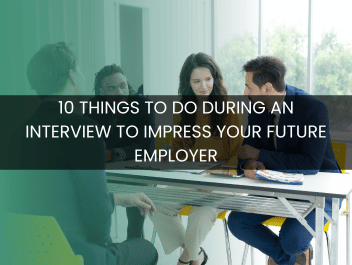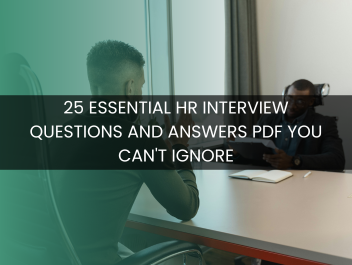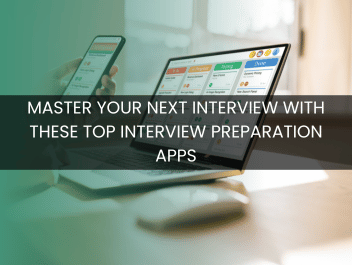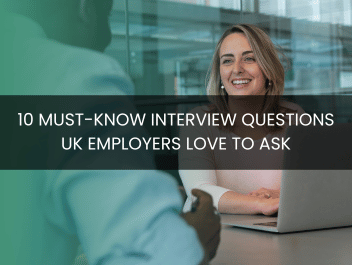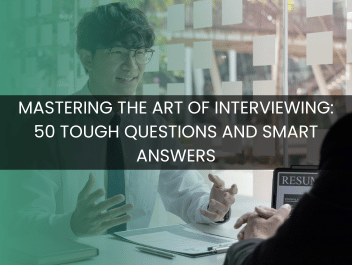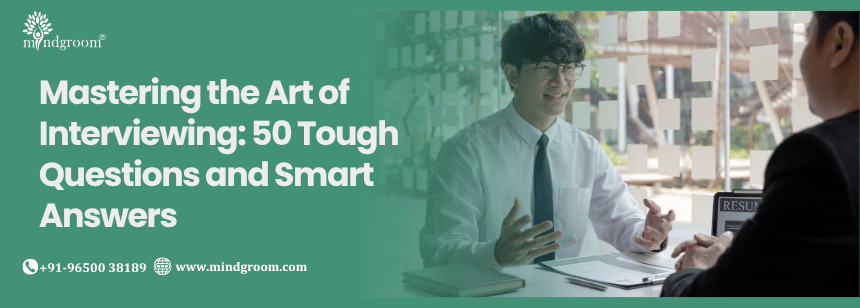
Mastering the Art of Interviewing: 50 Tough Questions and Smart Answers
Facing tough interview questions can be daunting, yet mastering them is a vital step on the pathway to your dream job. In the modern job market, interviews extend beyond basic queries, delving into hard interview questions that assess your problem-solving abilities and cultural fit. Preparing articulate and smart answers to these challenging prompts can make or break your interview success.
The intricate landscape of interview questions involves common, behavioral, situational, and technical queries, each designed to evaluate unique aspects of potential candidates. For instance, questions like "Describe a challenge you faced at work and how you overcame it" assess your ability to navigate complex situations—a crucial skill in any workplace. Similarly, understanding how to tackle "How would you handle a tight deadline?" can set you apart from other candidates by highlighting your prioritization skills.
This article will walk you through mastering the art of interviewing with 50 tough questions and smart answers, ensuring you're well-equipped for any hard interview question that might come your way. Uncover strategies to confidently navigate these queries and set yourself on a path to success in your career journey.
Table of Content
- 1. Mastering the Art of Interviewing: 50 Tough Questions and Smart Answers
- 2. Common Tough Interview Questions:
- 3. Introduction: Navigating the Interview Landscape
- 4. Common Interview Questions
- 5. "Tell me about yourself"
- 6. "What are your greatest strengths?"
- 7. "What are your weaknesses?"
- 8. "Why should we hire you?"
- 9. Behavioral Interview Questions
- 10. Situational Interview Questions
- 11. Technical Interview Questions
- 12. Handling Employment Gaps
- 13. "What have you been doing since your last position?"
- 14. Convincing Your Fit for the Role
Mastering the Art of Interviewing: 50 Tough Questions and Smart Answers
Navigating through a job interview can be intimidating, especially when faced with tough interview questions. Employers often use these hard interview questions to gauge your problem-solving abilities and understanding of the role. Here's a quick guide to help you master these tricky interview questions.
Common Tough Interview Questions:
- Describe a challenging situation you faced at work.
- How do you handle a difficult situation with a previous employer?
- What are your career goals and how does this position fit with them?
- Explain a time when you had to demonstrate leadership skills.
- What are your salary expectations for this current role?
Smart Answers:
- Use examples from your previous roles to illustrate
your problem-solving and leadership skills.
- Align your responses with the job description to demonstrate relevant
skills.
- Highlight your soft skills like communication skills and project management
skills.
Understanding the job interview process involves more than knowing common questions. It's about showcasing your interpersonal skills and leadership style. Preparing for tough interview questions not only aids personal growth but also aligns your potential with the company culture of your current employer. Remember, each question is an opportunity to show your readiness for the hiring process.
Introduction: Navigating the Interview Landscape
Navigating the interview landscape can be challenging and intimidating. Tough interview questions often surface, testing your readiness and adaptability. Whether it’s tricky interview questions about previous roles or hard interview questions on leadership skills, preparation is key.
In today’s hiring process, interviewers blend common interview questions with behavioral interview questions. They're keen on gauging your soft skills, such as communication skills and interpersonal skills, alongside project management skills. Understanding the job description and aligning your relevant skills with the company's expectations can set you apart.
Difficult interview questions are designed to reveal your problem-solving abilities and assess how you handle a challenging situation. Employers may explore your leadership role experiences or ask about your current role to understand your career path and goals. It’s essential to articulate your leadership style and illustrate personal growth through difficult situations.
For many, discussing salary expectations and company culture can also be a daunting part of the interview. Yet, showing alignment with the current employer's values can be crucial in advancing toward the current company’s expectations. By mastering tough interview questions, you can confidently seize new career opportunities.
Common Interview Questions
Interviews are stepping stones in any career journey, often marked by a series of common interview questions. These questions are not just about your knowledge, but about your ability to present yourself effectively. From discussing previous roles to current employer expectations, your responses must reflect your qualifications and alignment with the job description. In this section, we will delve into several key questions commonly posed in interviews. Preparing for these questions will enhance your confidence and support your personal growth. Whether you face questions about leadership skills or communication skills, understanding how to tackle them is crucial.
"Tell me about yourself"
"Tell me about yourself" is often the opening question in interviews, aiming to set the tone for the conversation. This question is less about your personal life and more about your career path, current role, and future aspirations. In two to three sentences, outline your professional background. It's important to connect your past experiences with the job description. Discuss previous roles and how those have shaped your skills and career goals. Highlight your interpersonal skills and how they've contributed to your success in various roles. This response is your chance to steer the interview and highlight what makes you an ideal candidate.
"What are your greatest strengths?"
Discussing your strengths requires introspection and an understanding of relevant skills for the position. Identify qualities that align with the job description and the company's needs. Are you a team player with strong communication skills? Or perhaps you possess excellent problem-solving abilities and project management skills? Keep your response focused on pertinent strengths that have been proven through your previous roles. Share quick anecdotes demonstrating these strengths in action. This approach shows the interviewer how you can apply these strengths to benefit their company. This is your chance to stand out and show potential employers your fit for the job.
"What are your weaknesses?"
Addressing weaknesses is a tricky interview question that demands honesty and a positive spin. Employers want insight into your self-awareness and commitment to personal growth. Start by acknowledging a genuine weakness—perhaps something related to leadership skills or a challenging situation. Then, demonstrate how you're working to improve it. This can involve pursuing additional training or adopting new strategies to overcome the problem. The key is to show that you're proactive in addressing weaknesses and continuously strive to develop your skills. This transparency can endear you to future employers, showcasing your adaptability and determination.
"Why should we hire you?"
This question is your opportunity to showcase why you’re the perfect match for the role. Highlight how your unique combination of relevant skills, experiences from your previous employer, and knowledge align with the company culture and job demands. Discuss how your soft skills, such as interpersonal skills and leadership style, make you an indispensable asset. It’s important to communicate not only how you can meet the current employer’s needs but also how you’ll contribute to the company's success. Make your case by articulating how past achievements have prepared you for this new challenge. Confidence and clarity in your response will underscore your value and place you ahead in the hiring process.
Behavioral Interview Questions
Behavioral interview questions focus on past situations to predict future behavior. Job interviews often include tough interview questions to assess competencies. These questions provide insight into soft skills and previous roles. Employers are interested in how candidates manage difficult situations. Let's explore some hard interview questions and how you can prepare to answer them effectively. Knowing how to handle these tricky interview questions can set you apart in the hiring process.
"Describe a challenge you faced at work and how you overcame it"
Answering this tough interview question requires you to illustrate your problem-solving abilities. Consider a situation at your current role or previous employer where you encountered difficulties. Explain the challenge and describe the steps you took to overcome it. Clearly outline the skills required, such as leadership skills or communication skills, that helped you succeed. Highlight how this experience contributed to your personal growth and strengthened your professional abilities.
Overcoming challenges at work often demonstrates resilience. Employers value candidates who can adapt and thrive under pressure. Your answer should reassure them that you are equipped to handle the demanding aspects of the job description. This is one of the hardest interview questions that tests not only your technical skills but your interpersonal skills too.
"Give an example of a goal you reached and how you achieved it"
This question focuses on your ability to set and achieve objectives. Begin by introducing a specific goal from your career path. It could be a milestone in your current company or a target you had with a previous employer. Explain the strategies and skills, such as project management skills, you employed to reach that goal. Be sure to include any challenging situations you overcame along the way.
Your response should convey your ambition and dedication. It's an opportunity to link your successes to your potential value to the company. Employers look for candidates who not only set goals but also achieve them through a combination of relevant skills and determination. This reflects positively on your ability to contribute to the company culture.
"Tell me about a conflict you've encountered and resolution strategies"
Conflicts are inevitable in any work environment. This tough interview question requires you to showcase your conflict resolution skills. Describe a conflict situation you've faced in a previous role, detailing the core issues involved. Discuss the resolution strategies you implemented, emphasizing your communication skills and interpersonal skills.
Employers seek candidates who can handle conflict with professionalism and poise. Your ability to resolve conflicts effectively reflects your leadership style and your capacity to maintain a positive working environment. Make sure to demonstrate your proactive approach to conflict resolution, which is a key component in fostering a healthy company culture.
"Describe a time you worked as part of a team"
Teamwork is an essential aspect of many job descriptions. For this tricky interview question, reflect on an experience where you collaborated with others. Identify a project or task from your current or previous roles where teamwork was crucial. Discuss how you contributed to the team's objectives and how you used your communication skills and leadership skills effectively.
Employers aim to hire candidates who thrive in team settings and can contribute positively to team dynamics. Highlight any interpersonal skills and project management skills that you employed. Conclude by reflecting on how this experience enhanced your career goals and personal growth. Your ability to work well in a team demonstrates your capacity to adapt to diverse working environments and drive success.
Situational Interview Questions
Situational interview questions are a staple in the interview process. Employers use these questions to gauge how you would react in potential job-related scenarios. They are designed to assess your problem-solving abilities and relevant skills. Successfully answering tough interview questions can set you apart from other candidates. In this guide, we will cover some of the most hard interview questions you might face and how best to approach them.
"How would you handle a tight deadline?"
Handling a tight deadline is one of the most challenging situations in the workplace. Interviewers ask this to assess your project management skills and ability to perform under pressure. To tackle this question, explain how you prioritize tasks, manage your time effectively, and remain focused. Mention any previous roles where you've handled similar situations successfully.
For instance, you might describe a scenario where you had to quickly adjust your schedule, delegate tasks, and maintain clear communication with your team. Highlight your ability to stay calm and organized, which are critical soft skills when faced with tough interview questions about deadlines.
"What would you do if you were given multiple tasks?"
Managing multiple tasks is a common occurrence in many jobs. This tricky interview question evaluates your organizational skills and how you maintain efficiency. When responding, detail your approach to prioritizing tasks based on urgency and importance. Demonstrating strong communication skills here is crucial to convey how you keep all stakeholders informed.
Explain how you break down tasks into smaller, manageable steps. You might mention using project management tools or techniques to streamline processes. By showcasing your ability to juggle several responsibilities effectively, you reassure interviewers of your competency in handling hard interview questions about multitasking.
"Describe how you would manage a difficult client"
Difficult clients can test your interpersonal skills and patience. This question assesses how you maintain professionalism in complex interactions. Start by emphasizing empathy and active listening. Discuss how understanding the client's needs is a priority in delivering successful outcomes.
Highlight strategies such as maintaining open and honest communication and setting clear boundaries. Share a past example where you resolved a client's concerns while aligning with your previous employer’s policies. Demonstrating a balance of assertiveness and customer service aptitude in handling tough interview questions about client management is crucial.
"If you were to start a new project, what's the first step you would take?"
Starting a new project requires strategic planning and clear vision. This question gauges your leadership skills and readiness to take initiative. When answering, describe how you would review the project requirements and objectives first. Initial assessment sets the foundation for the project's success.
Discuss forming a team with relevant skills and establishing communication channels. Address the importance of creating a timeline with milestones while being adaptable to changes. In answering tough interview questions related to new projects, emphasize strong leadership style and decision-making ability to pave a structured path forward.
Technical Interview Questions
Technical interview questions can be daunting. Yet, expecting these questions allows preparation, turning anxiety into confidence. Candidates face various questions, from technical proficiency to problem-solving. Learning to navigate these interviews is key to success. Let's dive into some tough interview questions often encountered on this journey.
"Explain a complex technical concept to a non-technical person"
Explaining technical concepts to non-technical people is a common challenge. This tough interview question assesses your communication skills. Clear communication of complex ideas can be crucial in a job interview. The goal is to simplify without losing essence. For instance, if explaining the internet, compare it to roads connecting different cities. This makes abstract concepts tangible. This approach helps align your technical insights with the interviewer’s understanding.
"Walk me through your coding process"
This hard interview question allows interviewers to glean insight into your problem-solving approach. Describing this involves breaking down your coding methodology into digestible steps. Start by understanding the problem fully. Next, design a clear plan. Write the code, keeping best practices in mind, then test it to ensure it works correctly. Emphasize troubleshooting strategies as they illustrate adaptability. This approach reflects a systematic mindset, a desirable trait in any job description.
"How do you prioritize bug fixes vs. new features?"
Balancing bug fixes and new features is a difficult interview question. Candidates must display an understanding of project management skills and priorities. Prioritization depends on impact and urgency. Explain that bug fixes usually take precedence if they significantly affect users. However, if a feature promises strong improvements to user experience, it may be prioritized. Show an awareness of company culture and goals. This question tests strategic thinking — a vital skill in a leadership role.
"Describe a technical challenge and how you solved it"
This tricky interview question aims to uncover your problem-solving skills and resilience. Begin with a brief description of the challenging situation. For example, mention a time when a system was failing. Share how you identified root issues through careful analysis. Detail the process and skills you used to find a solution, such as teamwork or a specific coding skill. Highlight your interpersonal skills by discussing collaboration with team members. Conclude with the outcome and what you learned for personal growth. This narrative demonstrates adaptability and the ability to overcome obstacles.
Handling Employment Gaps
Employment gaps are common, but they can pose tough interview questions if not handled well. During a job interview, interviewers often focus on these gaps to understand candidates' career paths. How you respond to hard interview questions about employment breaks can significantly affect your chances. Hiring managers often look for explanations that reveal relevant skills or personal growth during these times. Preparing for such tricky interview questions with clear, concise answers can help you establish confidence and demonstrate soft skills. Let’s explore ways to effectively address common and difficult questions about employment gaps.
"Why do you have a gap in your employment history?"
This is one of the toughest interview questions that candidates face. Employers ask this to assess your career path and understand any difficult situations you encountered. When responding, it is essential to be honest yet strategic. Your answer should align seamlessly with the job description to show that you still possess the relevant skills for the current role.
Begin by acknowledging the gap and explaining its reason. Whether it was for personal growth, handling a challenging situation, or exploring a leadership role, ensure you portray it positively. Highlight how the period aided in developing valuable skills like communication skills, leadership skills, or project management skills. For instance, if a personal situation required your attention, show how it enhanced interpersonal skills or decision-making abilities.
Your response could also focus on your career goals, mentioning steps you took during this time to align them with the position. Demonstrating a proactive approach in bridging the gap reflects a strong, adaptable candidate, ready for future challenges.
"What have you been doing since your last position?"
This question explores your activities and accomplishments during the unemployment period. Employers want to see how you utilized this time to remain productive and prepared for the next opportunity. A well-crafted response to this hard interview question will reassure them about your commitment to your career path and professional development.
Begin by discussing any activities that relate to the current employer’s needs. These could include pursuing further education or training relevant to the position. Mention ways you stayed abreast with industry trends or sharpened your skills that are pertinent to the job description. If you've volunteered or engaged in freelance work, illustrate how these roles enhanced your soft skills or project management capabilities.
In addition, don’t forget to convey any leadership roles or creative endeavors you took on during this period. Describe how these activities prepared you for the current role and aligned with the company culture. Highlighting your readiness and eagerness to contribute can showcase your versatility and readiness to tackle future challenges confidently.
Convincing Your Fit for the Role
In today's competitive job market, facing tough interview questions is inevitable. Hiring managers design hard interview questions to assess if a candidate is the perfect match for a role. Understanding how to handle these questions can make the difference between landing the job or facing another rejection. The key lies in articulating your fit for the position through a combination of relevant skills, previous experience, and alignment with company values. Let’s dive into the different aspects of answering some of the most common and difficult interview questions effectively.
"What interests you about this position?"
When interviewers ask what interests you about a position, they want to gauge your enthusiasm for the role. To answer this tricky interview question, highlight aspects of the job description that appeal to you. Discuss how the responsibilities align with your current role or previous roles. Mention any project management skills or leadership roles you've handled in the past that relate directly to the position. Demonstrating a clear understanding of the role and its challenges underscores your genuine interest and readiness.
Emphasize how this position fits within your desired career path. If the role offers opportunities for personal growth and leadership skills development, make sure to point this out. This shows the interviewer that you see the role as a stepping stone to achieve your long-term career goals. Finally, convey your excitement about the chance to contribute to the company.
"How does this role align with your career goals?"
This is one of the toughest interview questions you might encounter. Employers are interested in candidates whose career goals align with the company’s objectives. Start by articulating your long-term career goals and how this role propels you towards them. Make connections between the skills required for the position and the skills you aspire to master. Whether it's enhancing your communication skills or sharpening your project management skills, connecting your goals with the job impresses your potential employer.
If your ambition includes a leadership role, illustrate how this position offers that opportunity. Highlight any previous employer experiences where you showed leadership style suited for future growth. Paint a picture of mutual benefit; how the company helps you grow while your contributions advance their goals.
Don’t forget to express your enthusiasm about gaining new experiences in a challenging situation offered by the job. It shows your readiness to tackle difficult situations and develop relevant skills to excel.
"What makes you a good fit for the company culture?"
Understanding company culture is key in determining whether you’ll thrive in a new role. When faced with this hard interview question, emphasize your interpersonal skills and soft skills that align with the company’s values. Reflect on experiences from your current company or previous employer in which you exemplified traits valued by the new company.
Discuss how your interpersonal skills enable you to work effectively within a team, accommodating diverse personalities. Express your communication skills and how they foster productive relationships and collaborations within the workplace. This reassures employers that you can adapt to and enhance the existing company culture.
Mention any experiences that showcase your alignment with the company’s values. Whether it’s adaptability in a fast-paced environment or commitment to ongoing personal growth, painting a vivid picture of compatibility can convince the interviewers you are the perfect cultural fit.
Looking For Job Satisfaction on the long run?
Please feel free to contact our experts
Call to ask any question
+91-9319336222Monday to Saturday
(9:00 AM to 8:00 PM)Resent Blogs
10 Things to Do During an Interview to Impress Your Future Employer
Learn MoreCrafting Your Personal Narrative: A Guide to Writing About Yourself
Learn MoreTop 10 Essential Interview Questions and Expert Answers for 2025
Learn MoreAce Your Next Interview: Essential Questions and Expert Answers for 2025
Learn MoreFirst-Time Manager Interview: Crucial Questions and Strategies for Success
Learn More150 Essential General Knowledge Questions for Interviews in 2025
Learn MoreMaster the Google Interview: Strategies for Success in 2025
Learn MoreHow Can You Describe Yourself Professionally? 5 Key Strategies You Need to Know
Learn MoreMastering the Art of How to Take Interview: Essential Techniques for Success
Learn More25 Essential HR Interview Questions and Answers PDF You Can't Ignore
Learn More7 Tips to Ace Your HR Screening Round and Land Your Dream Job
Learn More10 Essential Tips for Acing Your Interview Exam
Learn More5 Unique Interview Format Examples to Stand Out in Your Next Interview
Learn More5 Powerful Techniques for a Memorable Interview Introduction
Learn MoreMaster Your Next Interview with These Top Interview Preparation Apps
Learn MoreMastering the Art: Top Interview Questions for 12th Class Students
Learn More7 Must-Know Interview Questions for Freshers to Ace Your Job Hunt
Learn MoreMastering Interview Questions for HR Position with Answers: Strategies for Success
Learn More12 Essential Interview Questions for Recruiter Position You Should Prepare For
Learn More10 Must-Know Interview Questions UK Employers Love to Ask
Learn More10 Creative Interview Writing Examples to Spark Your Imagination
Learn More15 Essential Managerial Interview Questions for Fresher
Learn MoreHow to Ace Your Next Mock Interview: Tips and Strategie
Learn More7 Key Strategies for a Successful Mock Interview Sessio
Learn MoreThe Ultimate Guide to Model Interview Questions: What Y
Learn More5 My Self Question Exercises to Unlock Your True Potent
Learn More10 Normal Questions That Can Spark Deep Conversations
Learn More15 Essential Personal Interview Questions for Freshers
Learn More10 Essential Phone Interview Questions You Can’t Afford
Learn More15 Essential Sales Interview Questions and Answers for
Learn More7 Key Situational Interview Questions Every Employ should ask
Learn More15 Essential Software Developer HR Interview Questions You Need to Prepare For
Learn MoreMastering the Technical Interview: Essential Questions and Answers
Learn MoreTop Strategies for Responding to Tell Me About Yourself in a Student Interview
Learn MoreTop 10 Interview Questions and Expert Answers
Learn MoreMastering the Art of Interviewing: 50 Tough Questions and Smart Answers
Learn MoreConnet Us
Unlock Your Dream Career Potential - Get Expert Advice From Our Counselling Experts
